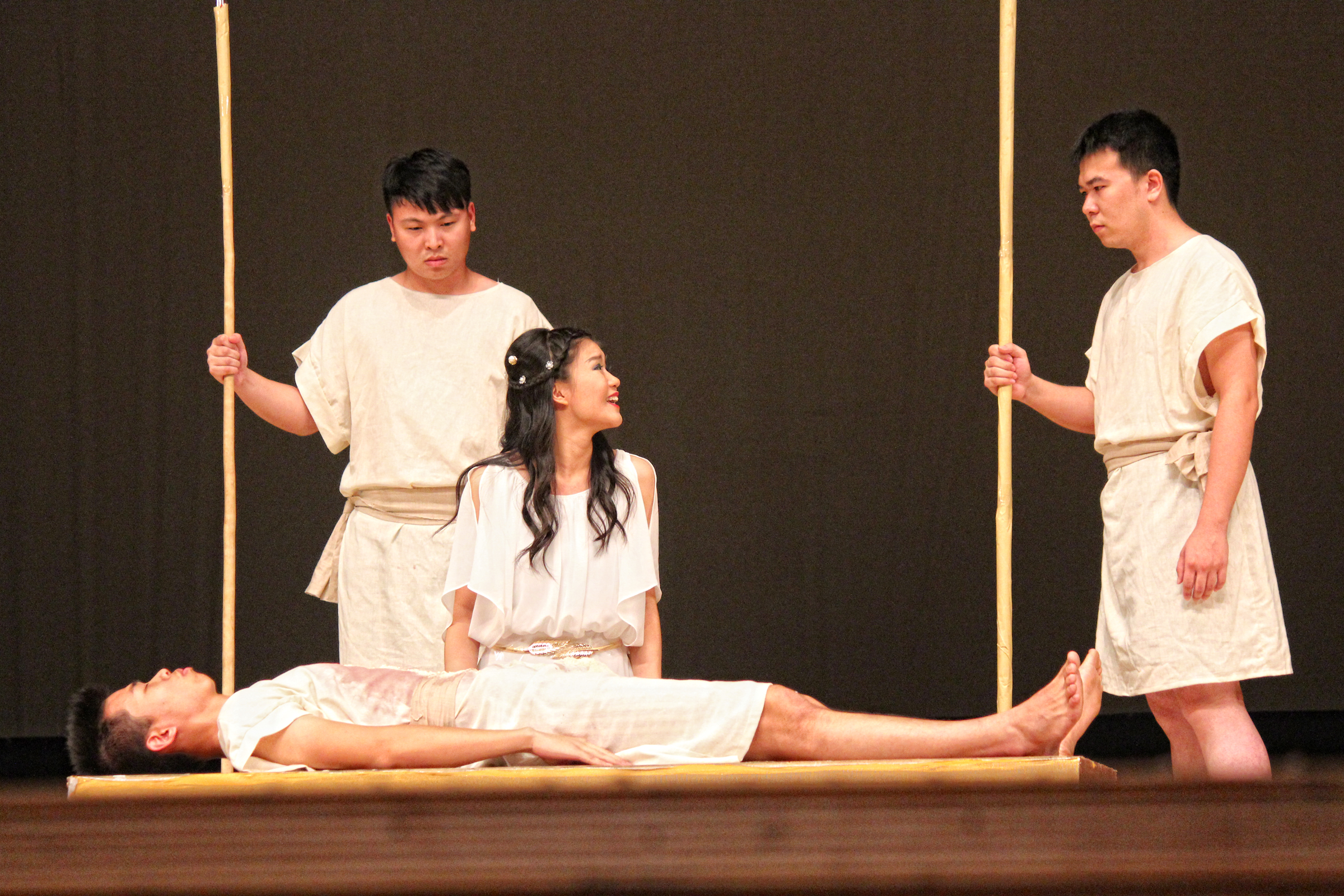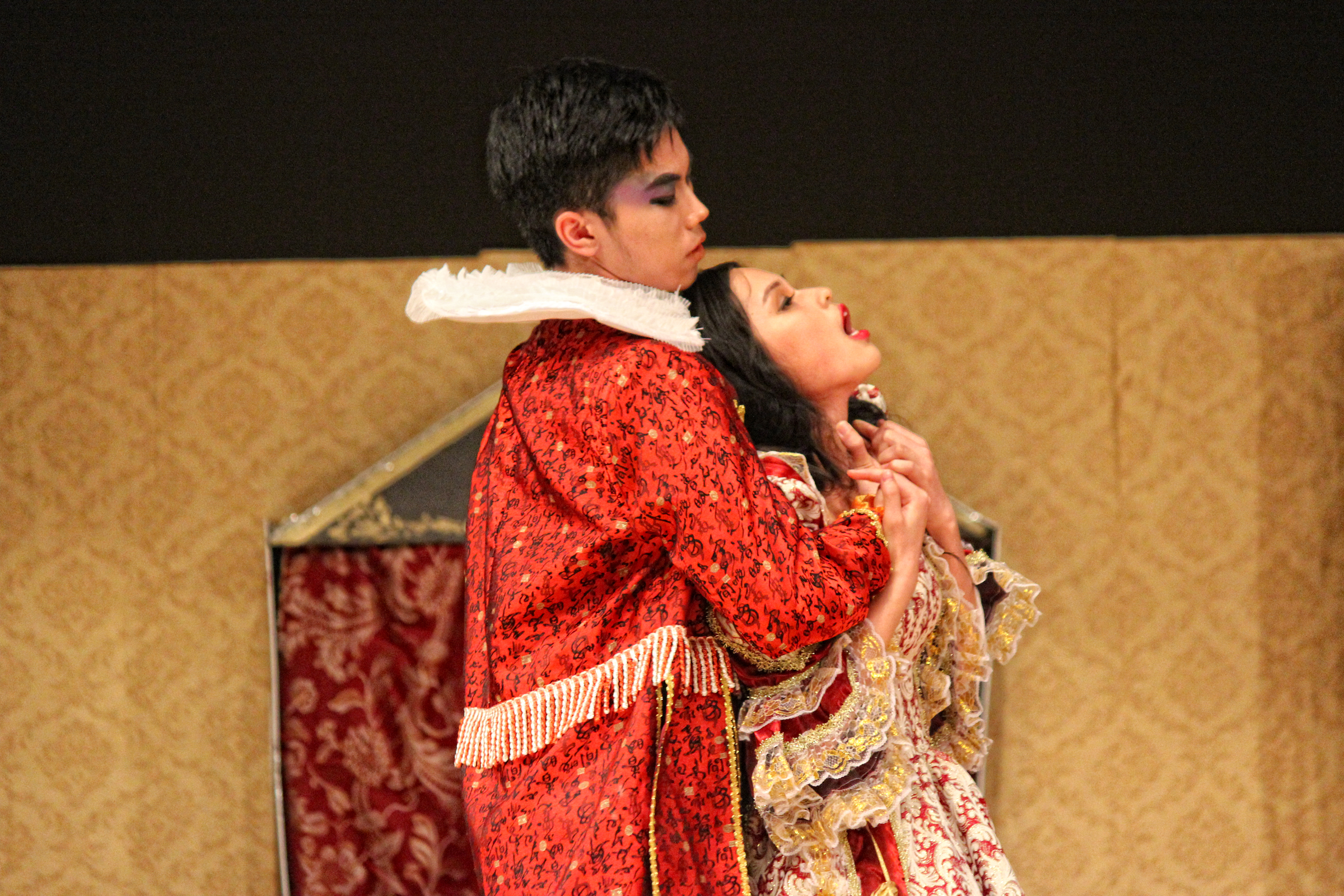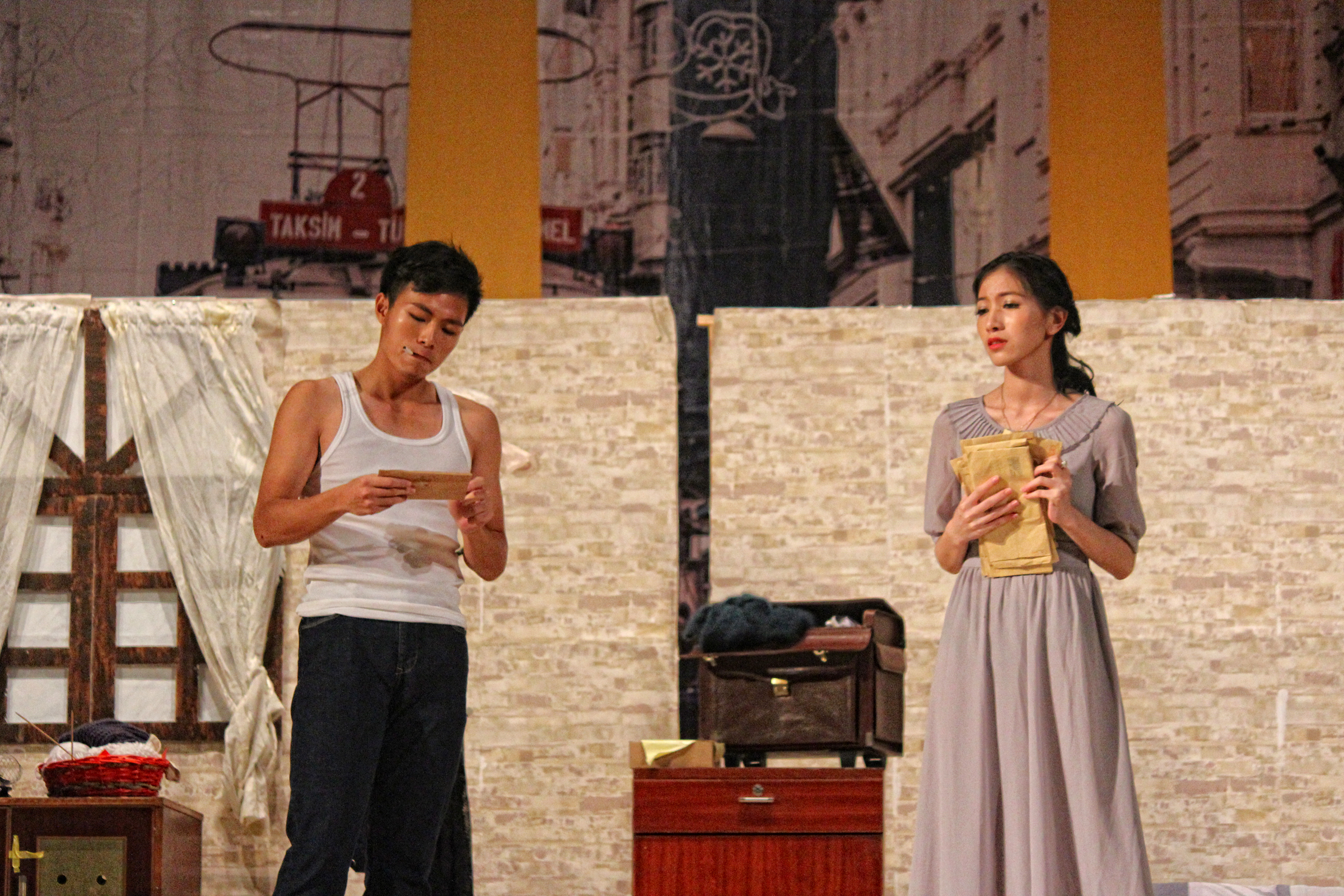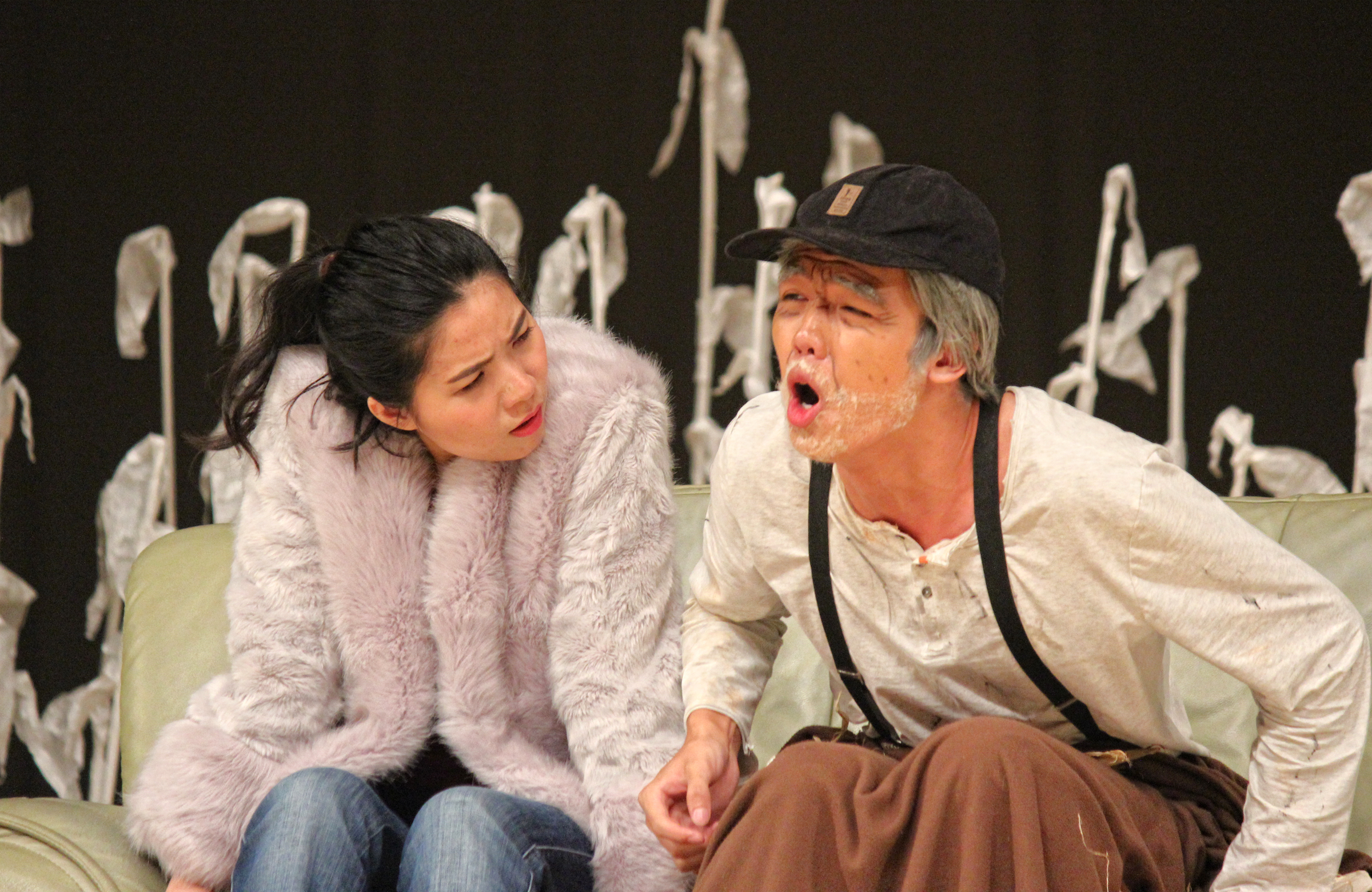On June 11th, 2015, the 17th Drama Night of FELC once again rocked Yunshan Hall on the north campus. This year, it was also specially arranged to celebrate GDUFS’s 50th anniversary. The night’s event was joined by distinguished guests including Ms. Dani WU from the British Consulate General at Guangzhou, Ms. LIU Zijun, Co-Director Manager of the Guangzhou Opera House and Ms. Vicki Ting, Vice-Consul from the US Consulate in Guangzhou. Deputy Party Secretary Professor LU Jinghui, Dean of FELC, Professor WEN Binli and professors from other universities and schools also attended the event.
There were, altogether, four plays and all were tragedies, emphasizing different themes of life, from different periods of time, and revealing different aspects of human nature, including courage, selfishness, greed and darkness.
Antigone——An Epic Greek Presentation of Moral Conflict
After Creon has become the new king, he decides that his dead rebel brother, Polyneices, will not have a formal funeral and will be displayed in public shame. However, the heroine, Antigone, wants to bury his beloved brothers’ body in defiance of Creon’s credit. She bravely argues with the king about the morality of her actions. The king is irritated by her disobedience and wants to kill her. Then Tiresias, the blind prophet, enters, warning Creon that what he is doing is wrong. Realizing this, Creon hurries to release Antigone, only to find that she has killed herself. Creon’s son, Haemon, also committed suicide after finding his girlfriend Antigone dead. The play ends with Creon crying sorrowfully in regret of his own deeds.

Antigone with her brother Polyneices’s body
The main theme of this play is the conflict between the law of god and that of nature. Antigone impressed people by acting bravery against an evil power. Also, the audience applauded for King Creon’s brilliant performance when seeing him shedding tears on the stage. Will and fate are intertwined in this play, like what Creon says in his famous line, “the fate is supreme, oh, let it come, so that I will never see tomorrow’s light.”
Duchess of Malfi——Inequality in Love
The Duchess, a widow, secretly falls in love with her steward Antonio and marries him. Her brother, Ferdinand, finds out this secret and regards his sister’s marrying to a man beneath her status as an offence. To separate them, Ferdinand sends his servant, Bosola to kill her. Bosola presents a fake corpse of Antonio, convincing the Duchess that her husband is dead, and then helps Ferdinand strangle her and her baby. Finding his wife’s death, Antonio becomes furious and fights with Bosola and his wife’s two brothers. They all die while executing their revenge.

Ferdinand strangling his sister the Duchess
The play emphasized on the misuse of power and the discrimination against different social classes. Because the story takes place in 17th century, costumes, makeup and the stage setting all showed the elegance and delicacy of ancient times, feasting the audience visually.
A Streetcar Named Desire——The Desire to Conceal, to Explore
Blanche travels from Laurel to New Orleans to live with her younger sister Stella and her husband Stanley. Stella treats Blanche very kindly, but Stanley doubts her story very much and wants to find out more about her, questioning her early marriage. At that time, Blanche meets Mitch at Stella’s house and they fall in love soon after. However, Stanley figures out Blanche’s true identity and tells everyone that she was a prostitute in a famous hotel and was once married. This truth comes so sudden, and Mitch breaks up with her. Stella is also deep in grief and disbelief. Unableto accept her totally-exposed life’s secret, Blanche experiences a mental breakdown. When a doctor shows up in Stella’s house and takes Blanche to the hospital, she goes willingly and says, “Whoever you are, I have always depended upon the kindness of strangers.”

Stanley reading Blanche’s love letters
The brilliantly genuine stage setting of this play brought audience back to the 1970s America. Costume design of different characters was also effective, as we felt Stanley’s rudeness and shrewdness from his sweaty T-shirt and sensed Blanche’s secret from her long chiffon dress. Blanche gave her last smile towards the audience while being taken away by the doctor, ending the play by showing that desire can never be fulfilled.
Buried child——A Buried Child, A Horrifying Secret
The play begins with the grandpa, Dodge, lying on the sofa complaining about his deteriorating health and his unyielding corn field in the backyard. He accuses his son Bradley, an amputee, of repeatedly cutting his hair when he is asleep. Another son of his, Tilden, is mentally unwell and does nothing except shucking corn into a bucket. Later, Dodge’s granddaughter, Shelly arrives, but ridiculously Dodge and Tilden fail to recognize her and deny her presence all the time. Shelly finds it strange when she discovers a photo of her grandma Halie with an unknown little baby in her arms. She also doesn’t understand why her father talks about a dead baby all the time. The whole thing seems unreasonable to her. So she becomes determined to find out the truth. After being questioned by Shelly for too long and irritated by his wife Halie and Father Dewis’s love affair, Dodge finally reveals the truth——that his wife Halie and his son Tilden once had a child, but he killed the baby and buried it in their backyard. After that, Halie stumbles into the backyard, screaming that she suddenly sees corn growing again.

Shelly and her grandpa Dodge
Buried Child is a combination of darkness and tragedy. The plot is symbolic and surreal. What is innovative about this play is that the script writer combined two roles into one by eliminating a main character, Vince, who is dodge’s grandson. The Dean of FELC, WEN Binli, thought highly of this play, commenting that “It’s a great production. I think it’s professional. We could definitely sell tickets for this production.”
After the last play, the competition came to an end. As professor WEN Binli predicted, Buried Child became the biggest winner of the night, winning altogether, ten awards.
Award List:
Best Female Dubber: LEI Ting (, Shelly)
Best Male Dubber: Hong Tao (, Dodge)
Best Supporting Actress: LIN Qianhui (, Halie)
Best Supporting Actor: LIANG Qiyu (, Bradley)
Best Leading Actress: JIANG Yanzhen (, Shelly)
Best Leading Actor: PAN Yu (, Dodge)
Best Director: LU Jiayan ()
Best Stage Effects:
Best Script Adaptation:
First Prize for Best Play:
Second Prize for Best Play:
Third Prize for Best Play: ,

